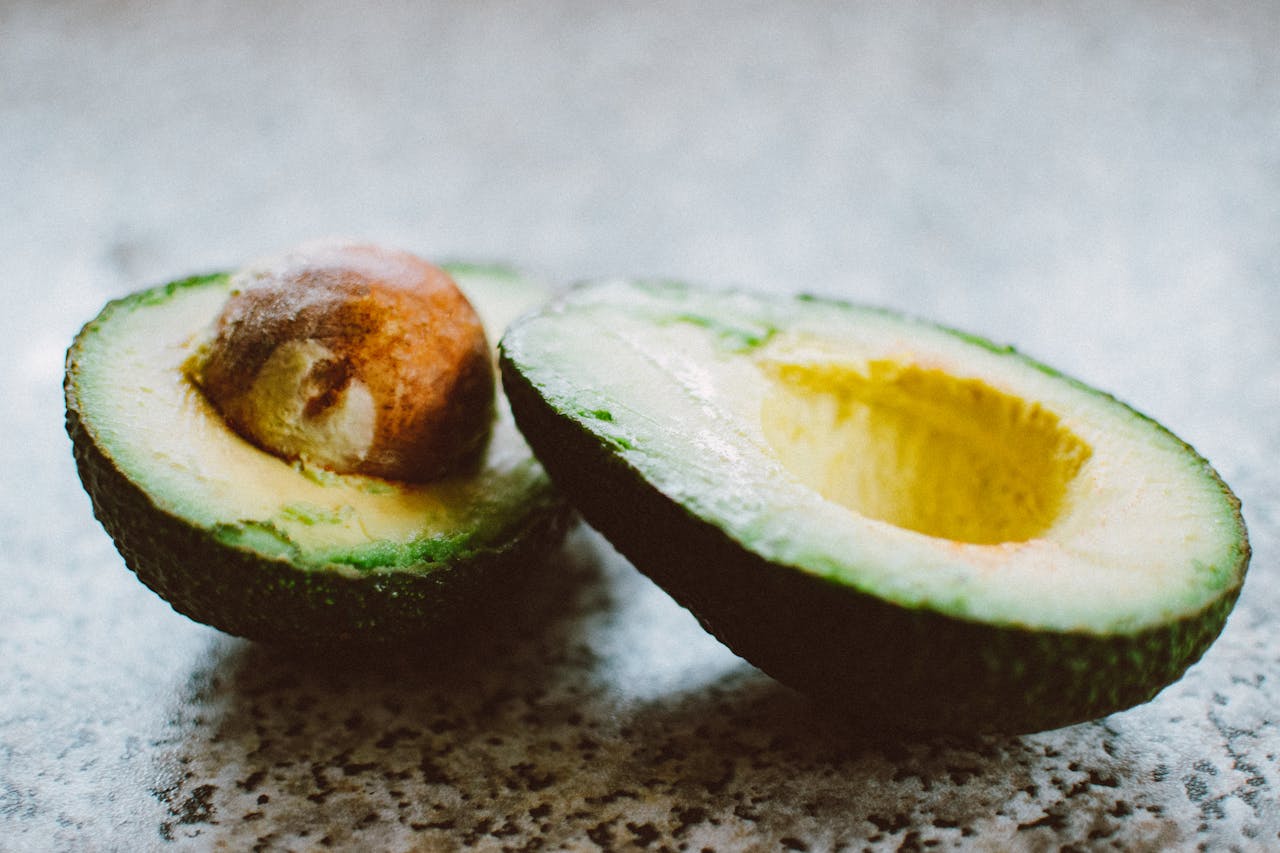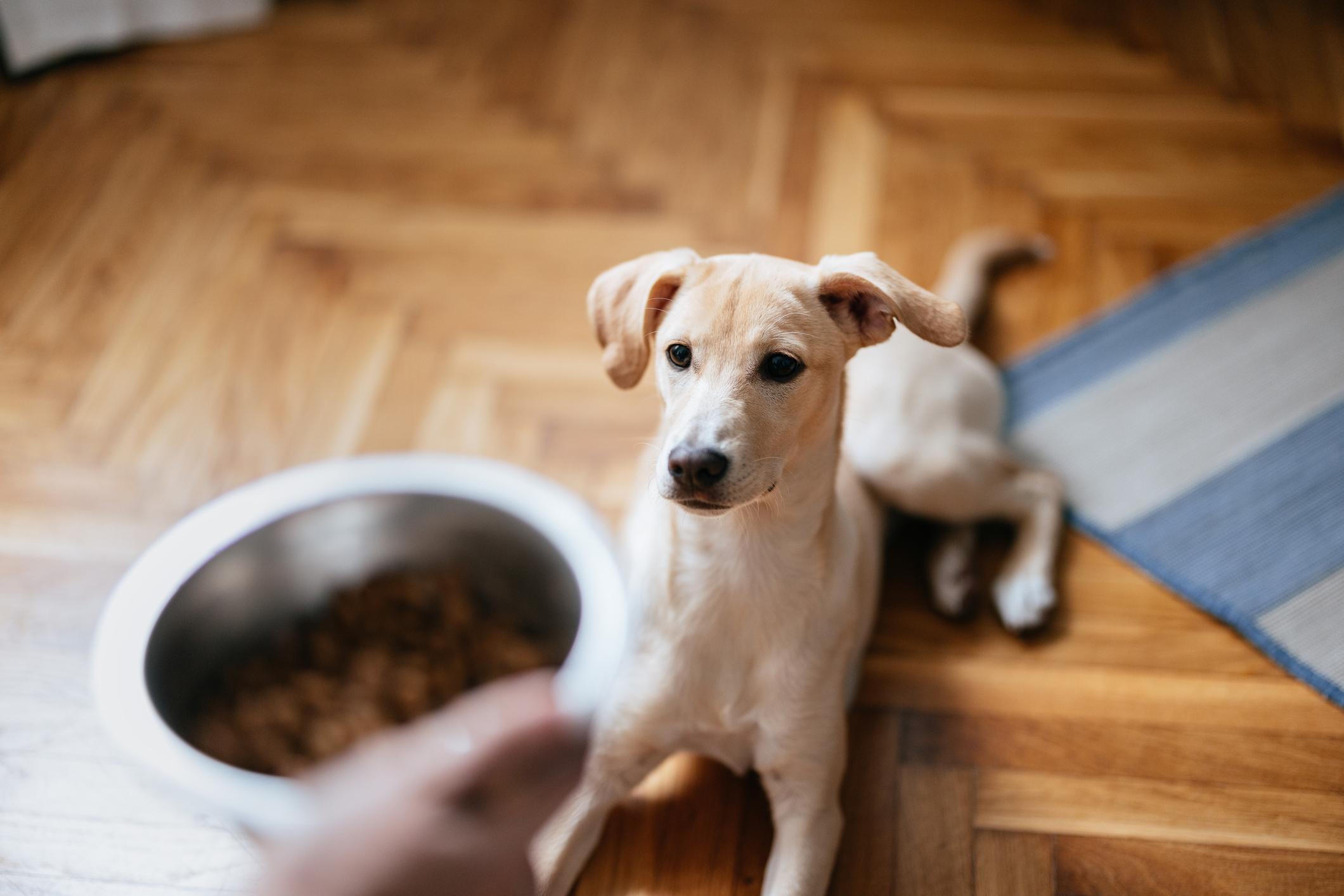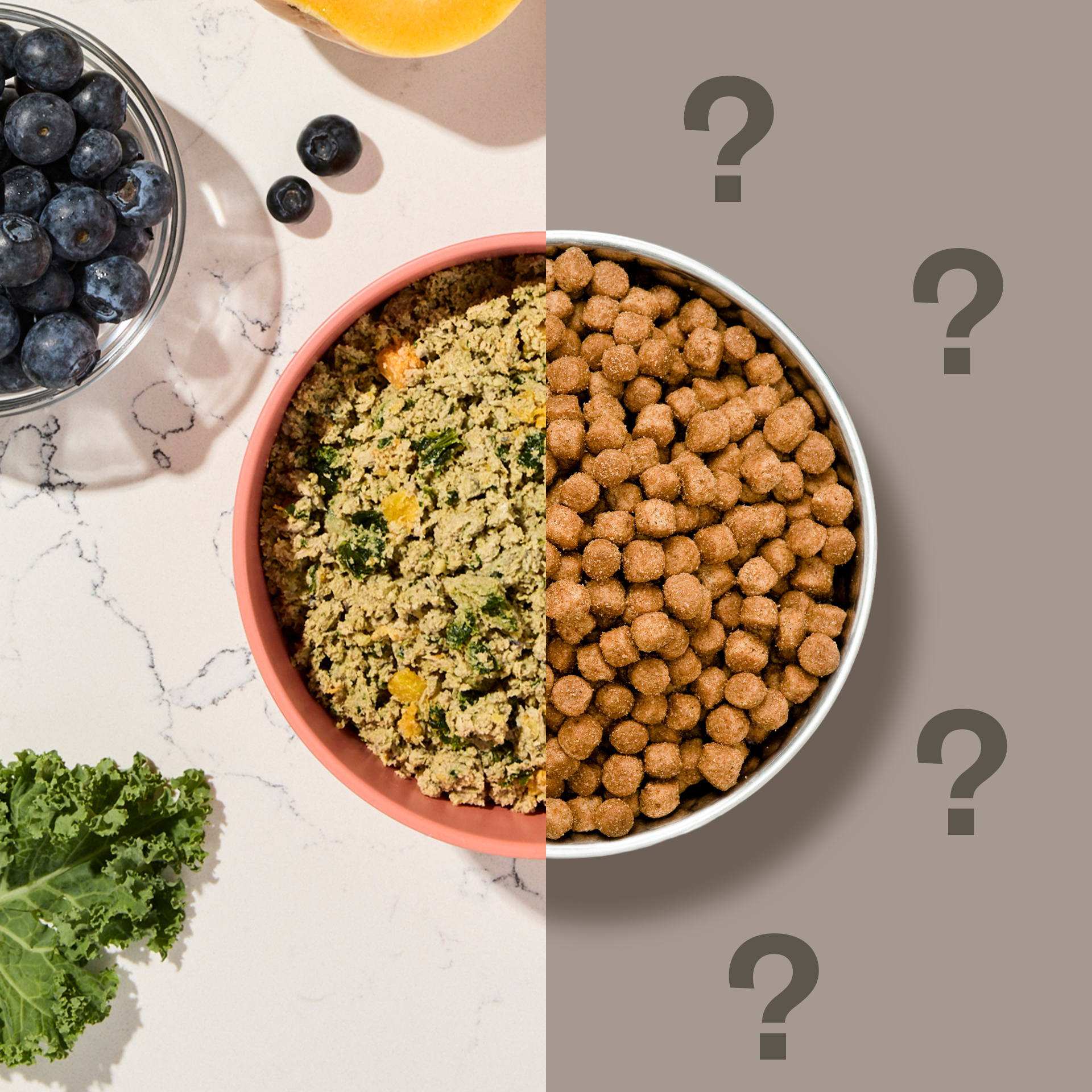Hey Ollie blog readers! We’re offering you an exclusive 60% OFF your starter box! Try now!
Avocados are a trendy superfood for humans, packed with healthy fats, vitamins, and fiber. But what about dogs? Can dogs eat avocados safely, or do they pose a risk?
The answer is complicated. While small amounts of avocado flesh may not be immediately harmful to some dogs, the risks outweigh the benefits. Avocados contain persin, a natural fungicidal toxin that can cause stomach upset, vomiting, and diarrhea in dogs. The pit, skin, and leaves pose even greater dangers, including choking hazards and potential intestinal blockages.
In this guide, we’ll break down why avocados aren’t the best choice for dogs, the potential health risks, and what to do if your pup accidentally eats some. Plus, we’ll share safer, dog-friendly alternatives to keep your pup healthy and happy.
Looking for a complete and safe diet for your dog? Ollie fresh, human-grade meals are crafted with vet-approved ingredients to ensure optimal nutrition—without any risky foods like avocados.
Key Takeaways
- Avocados contain persin, a toxin that can be harmful to dogs, especially in large amounts. While some dogs may tolerate small portions of avocado flesh, the risks make it an unsafe choice.
- The pit, skin, and leaves of the avocado are dangerous—they pose choking hazards and can cause serious digestive blockages.
- For a safe and nutritious diet, opt for vet-crafted meals like Ollie’s fresh, human-grade dog food, made with high-quality ingredients that support your pup’s health.
Can Dogs Eat Avocados
No, dogs should not eat avocados due to the potential health risks. While the flesh of an avocado contains lower levels of persin (a natural toxin), the pit, skin, and leaves contain higher concentrations, making them dangerous for dogs. Even a small amount of avocado can cause digestive upset, and larger amounts or ingestion of the pit can lead to serious health complications.
Some pet owners assume that because avocados are healthy for humans, they must be good for dogs too. However, the risks far outweigh any potential benefits. Instead of avocados, opt for safer, vet-approved foods that provide essential nutrients without the danger.
Are Avocados Safe for Dogs?
Avocados are not considered safe for dogs due to multiple health risks. While some dogs may tolerate small amounts of the flesh, avocados contain persin, a fungicidal toxin that can cause vomiting, diarrhea, and stomach discomfort. The highest concentration of persin is found in the pit, skin, and leaves, making them especially dangerous if consumed.
Why Avocados Are Risky for Dogs
- Persin Toxicity – Even though dogs are more resistant to persin than some animals, high amounts can lead to digestive distress.
- Choking Hazard – The large, hard pit can block a dog’s airway or cause an intestinal obstruction.
- High Fat Content – Avocado flesh is rich in fat, which can contribute to pancreatitis, a painful and potentially serious condition.
- Digestive Issues – Even if a dog eats a small amount, some pups may experience stomach upset, bloating, or diarrhea.
When to Contact a Vet
If your dog eats any part of an avocado, monitor them for signs of illness, including:
- Vomiting or diarrhea
- Lethargy or difficulty breathing
- Abdominal pain or bloating
If your dog ingests the pit, skin, or a large amount of flesh, call your vet immediately. The pit can cause serious blockages that may require medical intervention.
Risks of Avocado for Dogs
Avocados pose several risks to dogs, ranging from mild stomach upset to serious health complications. While some dogs may tolerate a small amount of the flesh, the potential dangers make avocados an unsafe choice for your pup.
1. Persin Toxicity
Persin is a natural toxin found in avocado leaves, skin, pit, and even the flesh. While dogs are more resistant to persin than some other animals, ingesting too much can cause:
- Vomiting
- Diarrhea
- Abdominal pain
- Lethargy
2. Choking Hazard & Intestinal Blockage
The avocado pit is a serious danger. It’s large, hard, and slippery, making it easy for a dog to accidentally swallow. If a dog ingests the pit, it can:
- Block the airway, leading to choking
- Cause an intestinal obstruction, which may require emergency surgery
3. High Fat Content & Pancreatitis Risk
Avocado flesh contains a high amount of fat, which can be difficult for dogs to digest. High-fat foods can lead to:
- Weight gain and obesity
- Pancreatitis, a painful condition that causes severe stomach inflammation and digestive issues
4. Allergic Reactions
Some dogs may be allergic to avocado, leading to symptoms like:
- Itchy skin or hives
- Swelling of the face or paws
- Difficulty breathing (in severe cases)
What to Do If Your Dog Eats Avocado
If your dog eats avocado, don’t panic—but act quickly depending on what part they consumed and how much. Here’s what you need to know:
Step 1: Determine What Your Dog Ate
- Avocado flesh (small amount) – Monitor for vomiting, diarrhea, or stomach discomfort. Most dogs will be fine, but if symptoms persist, contact your vet.
- Avocado flesh (large amount) – Too much fat can cause pancreatitis. Watch for bloating, vomiting, or lethargy. Call your vet if symptoms appear.
- Avocado skin or leaves – Higher in persin, which can lead to toxicity. Call your vet if your dog shows signs of illness.
- Avocado pit – This is the most serious concern. The pit can cause choking or an intestinal blockage, which may require surgery. Call your vet immediately.
Step 2: Watch for Symptoms
Signs of avocado poisoning or digestive distress include:
- Vomiting or diarrhea
- Loss of appetite
- Lethargy or weakness
- Difficulty breathing (if choking)
- Abdominal pain or bloating
If your dog shows any of these symptoms, contact your veterinarian immediately.
Step 3: Call Your Vet If Needed
For mild stomach upset, your vet may recommend at-home care, like a bland diet and plenty of water. However, if your dog ate a large amount of avocado, the pit, or the skin, your vet may suggest an emergency visit.
Can Dogs Eat Avocado-Based Products?
Many human foods contain avocado, but that doesn’t mean they’re safe for dogs. Here’s a breakdown of common avocado-based products and whether your pup can have them.
1. Guacamole – Not Safe for Dogs
Guacamole is dangerous for dogs because it often contains:
- Onions & garlic – Both are toxic to dogs and can cause anemia.
- Salt & spices – Too much sodium can lead to dehydration or salt poisoning.
- Lime juice – Citrus can upset your dog’s stomach.
Even if guacamole is made without toxic ingredients, the high-fat content of avocado can still cause digestive issues or pancreatitis.
2. Avocado Oil – Safe in Moderation
Unlike the fruit, avocado oil does not contain persin, making it generally safe for dogs in small amounts. It’s sometimes found in dog food because it contains healthy fats. However:
- It is still high in fat, so too much can lead to weight gain or pancreatitis.
- Always consult your vet before adding avocado oil to your dog’s diet.
3. Avocado in Dog Food – Use Caution
Some commercial dog foods contain avocado meal or oil, which are processed to remove harmful persin. If your dog’s food contains avocado-based ingredients, check with your vet to ensure it’s safe.
Safe Alternatives to Avocados for Dogs
If you’re looking for healthy, dog-friendly alternatives to avocados, there are plenty of safe fruits and vegetables that provide essential nutrients without the risks.
Dog-Friendly Fruits
These fruits are safe for dogs when served in moderation and without seeds, pits, or rinds:
- Blueberries – Packed with antioxidants that support brain and heart health.
- Apples – A great source of fiber and vitamin C (remove the seeds and core).
- Bananas – High in potassium and a great energy-boosting treat.
- Watermelon – Hydrating and low in calories (remove seeds and rind).
- Strawberries – Rich in vitamin C and fiber.
Dog-Friendly Vegetables
If you want to add more variety to your pup’s diet, try these vet-approved veggies:
- Carrots – Crunchy, low-calorie treats that support dental health.
- Pumpkin – Great for digestion and a good source of fiber.
- Green beans – Low in calories and full of vitamins.
- Broccoli – Provides fiber and antioxidants (serve in small amounts).
Fruits & Veggies to Avoid
Not all fruits and vegetables are safe for dogs. Avoid:
- Grapes & raisins – Can cause kidney failure.
- Cherries – Contain cyanide in the pits and stems.
- Avocados – Due to persin toxicity and choking hazards.
- Onions & garlic – Toxic to dogs and can cause serious health issues.
Want to give your pup a complete, balanced diet without the guesswork? Ollie’s fresh, human-grade meals provide all the essential nutrients your dog needs—without any risky ingredients like avocados.
Final Thoughts on Avocados For Dogs
Avocados may be a superfood for humans, but they’re not a safe choice for dogs. The persin toxin, high-fat content, and choking hazards make avocados a risky treat that can lead to digestive issues, pancreatitis, or even intestinal blockages. While some dogs may tolerate small amounts of avocado flesh, the potential dangers outweigh any benefits.
If your dog accidentally eats avocado, monitor for symptoms like vomiting, diarrhea, or lethargy, and call your vet if they consume the pit, skin, or a large amount of flesh.
Looking for a safe and nutritious diet? Skip the risky foods and choose Ollie’s fresh, human-grade meals, made with real, vet-approved ingredients to keep your dog happy and healthy—without the dangers of avocados.
Frequently Asked Questions About Avocados for Dogs
Can dogs eat small amounts of avocado?
Some dogs may tolerate a tiny amount of avocado flesh, but it’s best to avoid it. Even small portions contain persin, and the high-fat content can lead to digestive issues or pancreatitis.
What happens if my dog eats an avocado pit?
The pit is a serious choking hazard and can cause an intestinal blockage, which may require emergency surgery. If your dog eats a pit, contact your vet immediately.
Can dogs have avocado oil?
Avocado oil does not contain persin and is generally safe in small amounts. However, since it’s high in fat, too much can contribute to weight gain or pancreatitis.
What are the symptoms of avocado poisoning in dogs?
If a dog eats too much avocado, watch for:
- Vomiting or diarrhea
- Lethargy or weakness
- Difficulty breathing (if choking on the pit)
- Abdominal pain or bloating
If your dog shows any of these symptoms, call your vet.
What’s a safe alternative to avocados for dogs?
Many fruits and vegetables are safer options! Blueberries, apples (without seeds), bananas, and carrots all provide vitamins and antioxidants without the risks of avocado.
Tagged As:

The nutrition your dog needs,
the food they want.

Enjoying our articles? Subscribe our Newsletters and get new articles directly to your inbox
You might also like
18 August 2025
9 MINS READ
Nourish Skin from Within: Fresh Dog Diet Benefits
If your dog is constantly scratching, licking their paws, or has a dull, flaky coat, it’s not just frustrating—it could be a sign that something’s off in their diet. Skin and coat issues are som…
by Ollie Pets
12 August 2025
5 MINS READ
Top 8 Allergens Hiding in Your Dog’s Bowl
As pup parents, we never want to see our dogs uncomfortable. When it comes to itching, swelling, and upset stomachs, the culprit may be in their bowl. Understanding the most common allergens and t…
by Ollie Pets
11 August 2025
5 MINS READ
Not all Processing Is Equal: What’s Really in Your Pet’s Bowl?
As pet parents, we know how important it is that our dogs live long, healthy, and happy lives. This is why at Ollie, we focus so much on what goes into their bowls. But did you know there may be s…







